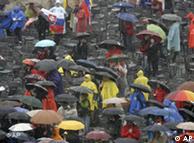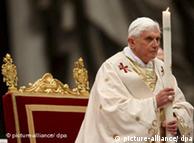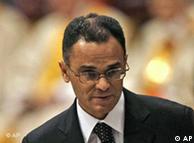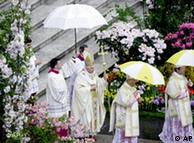Religion | 23.03.2008
Pope's Easter Message Aimed at Conflict Zones
Pope Benedict XVI on Sunday urged peaceful solutions in the world's hot spots including Tibet, the Middle East and Africa during his traditional Easter message.
In this Easter message, the pope called for an end to injustice, hatred and violence around the world, focusing on some of the world's most conflict-ridden places.
"How can we fail to remember certain African regions, such as Darfur and Somalia, the tormented Middle East, especially the Holy Land, Iraq, Lebanon, and finally Tibet, all of whom I encourage to seek solutions that will safeguard peace and the common good," the pope said in his "Urbi et Orbi" (to the city and the world) message.
 Bildunterschrift: Großansicht des Bildes mit der Bildunterschrift: People under umbrellas attend mass led by Pope Benedict XVI in St. Peter's Square
Bildunterschrift: Großansicht des Bildes mit der Bildunterschrift: People under umbrellas attend mass led by Pope Benedict XVI in St. Peter's Square
Speaking as pilgrims in Saint Peter's Square braved a steady rain, the 80-year-old head of the world's 1.1 billion Catholics wished that "the light that streams forth from this solemn day (may) shine forth in every part of the world."
From the solemnity of Easter, "in which we relive the absolute, once-and-for-all experience of Jesus' resurrection, we receive an appeal to be converted to love; we receive an invitation to live by rejecting hatred and selfishness," Benedict said.
The pontiff then offered Easter greetings in 63 languages to the tens of thousands pilgrims in the rain-soaked square and millions of others watching live broadcasts in 67 countries.
Tibet crisis
On Wednesday the pope broke his silence on the crisis in Tibet, calling for an end to violence there and urging "dialogue and tolerance."
Beijing brushed off the appeal, according to Italian press reports that quoted foreign ministry spokesman Qin Gang as saying Thursday: "Supposed tolerance cannot exist for criminals who should be punished by the law."
 Bildunterschrift: Großansicht des Bildes mit der Bildunterschrift: Pope Benedict XVI holds a candle during the Easter vigil mass on Saturday
Bildunterschrift: Großansicht des Bildes mit der Bildunterschrift: Pope Benedict XVI holds a candle during the Easter vigil mass on Saturday
On Easter, the pope did not mention China, whose relations with the Vatican have become very tense.
While the pope and his co-celebrants were sheltered from the rain by a huge canopy in front of Saint Peter's Basilica, Benedict said to the pilgrims huddled under umbrellas: "Let's consider (the
rain) as a gift of God."
Benedict chose the white and gold vestments and gold mitre of Benedict XV, his namesake who reigned from 1914 to 1922, for the occasion.
Muslim conversion
Religious freedom has been a theme of this year's Easter celebrations. At Saturday's Easter vigil, the pope baptised a former Muslim and a critic of Islamic extremism, journalist Magdi Allam.
 Bildunterschrift: Großansicht des Bildes mit der Bildunterschrift: Magdi Allam
Bildunterschrift: Großansicht des Bildes mit der Bildunterschrift: Magdi Allam
Allam, 55, an editorial writer and deputy publisher of the Corriere della Sera newspaper, wrote a letter to the paper published Sunday in which he branded his former faith as intrinsically violent.
"I had to do this (abandon Islam)," Allam wrote. "Beyond... the phenomenon of extremists and Islamist terrorism at the global level, the root of evil is inherent to a physiologically violent and
historically conflictual Islam."
The Egyptian-born Allam's conversion to Christianity was kept secret until the Vatican disclosed it in a statement less than one hour before start of the Saturday night service.
In its relations with Islam and other religions the Vatican has stressed both freedom of religion and the right to convert to another faith.
"For the Catholic Church, each person who asks to receive baptism after a deep personal search, a fully free choice and adequate preparation, has the right to receive it," said the Church in a statement.

Comments